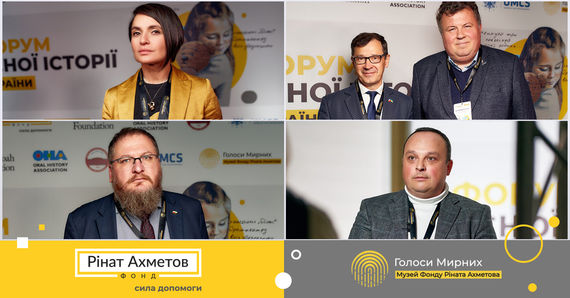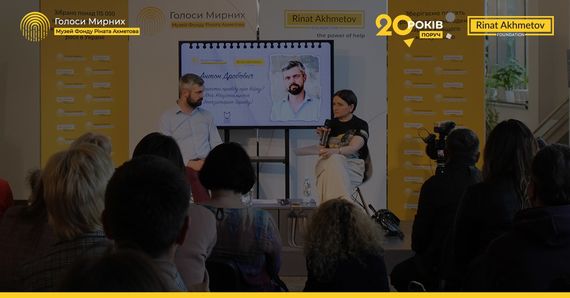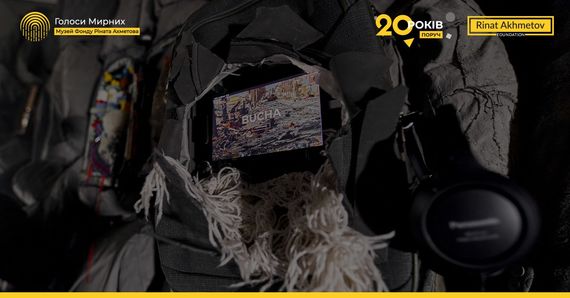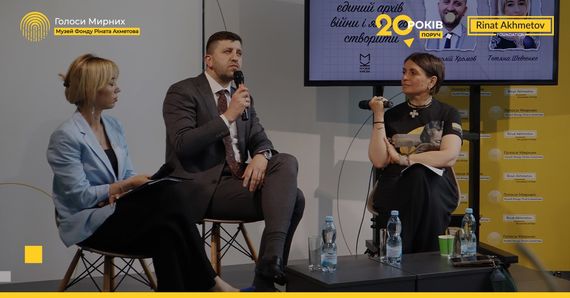Forum of Oral History of Ukraine: Why It Is Important to Document Wartime Experiences

The first Forum of Oral History of Ukraine, which took place in Kyiv in October, left behind many quotes and opinions worthy of attention. In particular, the event’s partners and its keynote speakers shared their views on why it is important to document the experiences of Russia’s war in Ukraine.
The event was organized at the initiative of the Rinat Akhmetov Foundation’s Museum of Civilian Voices in partnership with the USC Shoah Foundation and the Oral History Association, Taras Shevchenko National University of Kyiv and Maria Curie-Skłodowska University in Lublin (UMCS).
Professor Valentyn Baluk, director of the Center of Eastern Europe at Maria Curie-Skłodowska University in Lublin, emphasized the importance of the cooperation between the UMCS and the Museum of Civilian Voices, which has been going on for almost a year, and also spoke about the implementation of the motto “Never again”.
“The initiative launched by the Museum is very necessary, not only to document oral history testimonies among people who have survived the horrors of the war since 2014. It is important to pass on these accounts to future generations. In order for “Never again” to be effective, it is necessary to prove Russia’s guilt in court, so that Russia and its rulers are held accountable before international courts. Russia attacked Ukraine not for the first time, because it has never borne responsibility for its crimes.”
Professor Volodymyr Bugrov, rector of Taras Shevchenko National University of Kyiv, considers documenting wartime experiences and evidence no less important than criminal evidence in order for crimes to be condemned historically and never repeated.
“Russian bustards usurped the victory in the Second World War, where there were four Ukrainian fronts, where half of Ukraine’s population fought, and the country’s entire territory was occupied. We say, “never again”, and they say, “we can do it again”. This usurpation of historical heritage and moral legitimation lead to repetition. I am convinced that this project, which we are witnessing now, is extremely important for society precisely in the moral-historical, moral and legitimizing plane.”
Anton Liagusha, candidate of historical sciences, academic director of master’s social and humanitarian studies at the Kyiv School of Economics, emphasized the significance of documenting any evidence of the war.
“All evidence, from Twitter and TikTok to museums and archives, and the work of historians, are necessary. The first task is: they enable us to interpret our own history from the viewpoint of a political nation. The second task is about the professional work on collecting evidence that will be documents at the international court. The third one means the opportunity to tell and show the world what is happening here, so that they help us and we fight together. The fourth task is about the opportunity to show various experiences. We will not have one organization or party that will tell the history of this war on its own behalf. The voice of every Ukrainian matters.”
Natalya Yemchenko, Public Relations and Communications Director at SCM and member of the Rinat Akhmetov Foundation’s supervisory board, noted that documentation initiatives about the war work not only for history, and there is a strong point in that.
“This is a very important contribution to the formation and preservation of the truth about this war. It is a question of national memory for Ukraine: what we know about ourselves is the result of the narratives of other countries, and we must reclaim our own narrative. That is all that relates to justice. It is about making the world aware through the stories of people living through the war. It is also about the work with war trauma and therapy.”
Doctor Piotr Cywiński, historian, public figure, director of the Auschwitz-Birkenau State Museum and president of the Auschwitz-Birkenau Foundation (Poland), voiced his opinion on the importance of documenting the events and stories of the war.
“This will become evidence in court proceedings: judges and prosecutors need to know who was personally present during the event and can witness about it. This is critical to the legitimacy of these processes. This is one of the most important sources of information about the war for historians. And this is very important for the education of new generations, who will be able to hear the voices of victims of this war.”
The Forum is an initiative of the Rinat Akhmetov Foundation’s Museum of Civilian Voices, which documents first-person accounts of civilians about the war and has now collected more than 85,000 stories. Follow the news about the held event on the Museum’s website at https://civilvoicesmuseum.org/news



